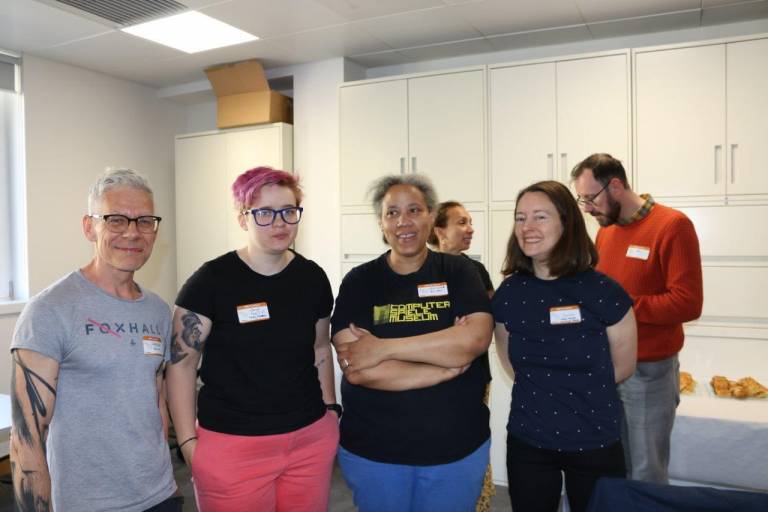Inclusion Group meets at UCL to prepare for government inquiry
24 July 2019
UCL hosted the inaugural meeting of The Inclusion Group for Equity in Research in STEMM (TIGERS) last month. The group, focuses on improving equality, diversity, inclusion & accessibility in science, engineering and related subjects.

UCL hosted the inaugural meeting of The Inclusion Group for Equity in Research in STEMM (TIGERS) last month. The group, which focuses on improving equality, diversiy, inclusion & accessibility in science, engineering and related subjects, has prompted a government investigation into the subject, and met to discuss next steps for the inquiry.
TIGERS began in November 2018 with a submission to the Science and Technology Select Committee (STSC), a government body which ensures policy is based on good scientific advice and expertise. In response to the STSC #myscienceinquiry call for topics, over 200 professionals backed a proposal by Prof Rachel Oliver (University of Cambridge) for “an inquiry into the extent to which funding policies, procedures and cultures are marginalising and excluding individuals from a wide range of backgrounds, a problem that threatens the creativity and productivity of UK STEM.” This became the TIGERS. From the 86 topics suggested for inquiry, 3 were chosen to become full investigations, including this proposal for equity in scientific research.
The day-long meeting was held in UCL Engineering, and participants learnt about the parliamentary inquiry process, and developed a document outlining their aspirations for questions the inquiry might answer. Later, small break-out groups worked together and developed strategies to gather evidence about the barriers different minority groups face in their scientific careers.
Over 40 scientists and researchers from a diversity of backgrounds and career stages came in person for the event, from as far as Glasgow, while others participated online. As you’d expect, the meeting made provision for people attending with access needs, including visual and hearing impairments and mental health needs. UCL Engineering provided funds towards accommodation, travel and catering, with extra assistance from UCL Biochemical Engineering, Mechanical Engineering, Geography and Medicine. This support meant that no-one faced financial obstacles to attending. Attendees commented that it was an important and refreshing meeting.
“"Meeting people face-to-face after months of discussions of EDI issues online was really important and memorable. The framework of talks helped enormously with focusing on what we need to do to prepare fully for the #myscienceinquiry- we're all really grateful to UCL for hosting and it was great to have the Dean present to welcome us all"
(Prof Cathy Abbott, University of Edinburgh)
“ "It was so refreshing to be in a room full of people all in agreement that equality, diversity, inclusion and accessibility are important. Less time spent explaining this meant much more time to focus on the problem at hand!"
(Dr Candice Majewski, University of Sheffield)
Dr Vanessa Diaz, Vice-Dean of UCL Engineering (Diversity & Inclusion) summarised the importance of the event and thanked the team who made it possible:
“"I cannot thank Prof Nigel Titchener-Hooker (Dean of UCL Engineering) enough for supporting us in this national endeavour. We are fighting the good fight for equality and inclusion. STEMM needs all of our voices, from all our different backgrounds and experiences. STEMM needs us all if we are to thrive. Nigel is a fantastic ally, and we need more allies: come forward and support your colleagues if you are, or have been, in a privileged position.
Finally, a shout out to the other UCL TIGERS who helped organise the meeting, and have been pivotal in group organisation and online discussions: Dr Michael Sulu (Biochem Eng), Dr Inés Pineda-Torra (Medicine), Dr. Lia Li (Physics) and Prof Anson Mackay (Geography). I did very little compared to the others and I'm very grateful for their support and friendship. We owe immense gratitude to Dr Michael Sulu (Biochem Eng) for being a terrific host, for all his work, energy and bonhomie. We are also very grateful to colleagues from Professional Services at Biochemical Engineering who assisted with the event throughout the day. I'm learning more than I thought I would with this group and the TIGERS. It has been an education. To colleagues and students I say: be hopeful, receptive and willing to learn. Listen. Come forward. Do the right thing. We can make STEMM inclusive for everyone "
Further information about the TIGER in STEMM group and updates on their work can be found at https://www.tigerinstemm.org/.
 Close
Close

